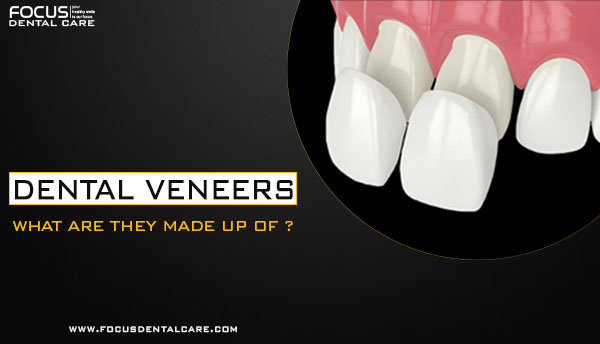Dental Veneers improve the appearance of your smile by masking discolorations, closing gaps, correcting minor misalignments and mending chipped teeth. Each veneer is customized to adjust the color, size, shape, appearance, position, rotations, texture of an individual’s teeth.
Have you ever wondered what are these dental veneers made up of ?
Depending on the results that one is aiming for there are different types of Dental Veneers that can be used.
Composite Veneers
Composite veneers are also known as composite resin veneers. They can usually be done in a single session. They are made up of resin or plastic which makes them prone to staining, chipping and breakage. However, they can also be easily repaired. The procedure for composite veneers involves restoring the tooth structure, layer by layer with composite followed by polishing when desired shape and size have been attained. We have certain limitations of getting a natural effect with composite veneers.
Porcelain Veneers
These are thin shell-like structures made up of ceramics. They are more durable than composite veneers. The strength of porcelain veneers is pretty close to the strength of the human enamel. If taken good care, porcelain veneers may even last from somewhere between 10 to 20 years. They help in attaining a more natural look and give a better translucency as compared to the composite veneers. Due to recent advancements in the field of esthetic dentistry the porcelain veneers have enhanced to the point that it is almost impossible to distinguish between a veneer and a natural tooth.
Non-Prep Veneers
As the name itself suggests ‘non-prep veneers’ are no preparation veneers. They are made up of a material called disilicate lithium and are popular as E Max Veneers. There is barely any tooth reduction to be done for this type of dental veneer. Their thickness can be somewhere between 0.3mm to 0.5mm, which is quite similar to that of contact lens. They are exceptionally thin but durable enough. They are used in cases where fullness of the teeth has to be increased. However, one drawback to these kinds of veneers because of their ultra-thin nature is that in some cases it gets difficult to mask major discolorations and the darker tooth shows underneath.
CEREC® Veneers
Chair-side Economical Restoration of Esthetic Ceramics abbreviated as CEREC is a CAD/CAM (computer aided designing/computer aided manufacturing) technology based in-house milling and scanning machine which helps in creating veneers on the day of the appointment itself. This machine produces custom ceramics according to the need of the patient using a raw ceramic block. With the innovative CEREC® Veneers the number of sittings and visits to the dentist has decreased manifold which makes the whole process of getting dental Veneers hassle-free for the patient.
So, if you find yourself having a chipped tooth, gaps between teeth, discolorations of teeth, minor misalignments, curvatures or rotations you should consider having dental veneers as a solution to these problems.
At Focus Dental Care Gachibowli and Focus Dental Care Jubilee Hills our Prosthodontist will provide you with the most suitable treatment plan according to your needs and desired results. Our center is equipped with the innovative CAD/CAM based CEREC technology which not only reduces the number of visits you make but also lets you see your scan real-time, which gives you an idea of what your end results are going to look like.
To know more or to discuss about your case you can reach us at (insert contact and enquiry details).


